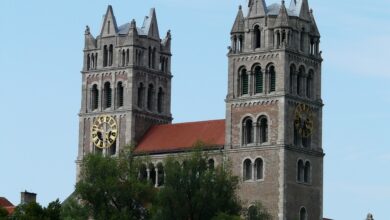
AfD candidate Robert Sesselmann has emerged victorious in the runoff election for the district administration office in Sonneberg, Thuringia. With this win, the party has achieved its first-ever district leader position in Germany. In Thuringia, the AfD is classified as right-wing extremist by the constitutional protection agency and is under observation.
According to the election committee, the 50-year-old Sesselmann received 52.8 percent of the votes in the district located in southern Thuringia, thus obtaining the necessary absolute majority. CDU candidate Jürgen Köpper, who was also supported by The Left, SPD, Greens, and FDP, lost with 47.2 percent of the votes. The voter turnout, according to the State Statistical Office, was 58.2 percent. In the first round of the election, Sesselmann had already received almost 47 percent of the votes. The district, located in the Thuringian Forest, has a population of 57,000 and around 48,000 eligible voters, making it one of the smallest in Germany.
Sesselmann is a lawyer and currently serves as an AfD member of the state parliament in Erfurt. As the future district leader, he will have a platform to advocate for the AfD’s agenda, including protesting against the accommodation of refugees. However, Sesselmann’s scope for action will be limited. According to the law, a district leader manages the district administration and implements the decisions of the district council, often resembling the role of a chief executive officer.
CDU candidate Köpper described the election outcome as „disappointing“ and said it was a bad day for the Sonneberg district and Thuringia as a whole. He attributed the result to the negative impact of the federal government’s poor policies, which overshadowed the election campaign.
Sesselmann and the AfD campaigned primarily on federal issues such as the controversial heating law, high inflation, and increased numbers of refugees. In the predominantly rural and conservative region, the election was seen as a referendum on federal politics, which many people are currently dissatisfied with.
According to a report by „Spiegel,“ the Thuringian police are investigating Sesselmann for allegedly verbally threatening a man who was putting up CDU posters during the election campaign. The AfD politician is said to have accused the man of tampering with Sesselmann’s posters.
Thuringia’s Minister of the Interior and SPD Chairman Georg Maier described the election result as an „alarm signal for all democratic forces.“ He emphasized the need to put aside party interests and collectively defend democracy. In Thuringia, the party is classified by the constitutional protection agency as proven right-wing extremist and is under observation.
Minister President Bodo Ramelow sees the AfD’s electoral success as a signal of dissatisfaction. He believes that the „spirit of German unity“ needs to be redefined so that the people of East Germany feel included and not ridiculed or talked about. Ramelow emphasized that it was a democratic election and Sesselmann had gained the trust of the voters. However, he also highlighted that it was the election of a municipal elected official, and the new district leader would have to prove that he can address the needs of the district. „He leads an administration,“ Ramelow emphasized.
Björn Höcke, the head of the AfD in Thuringia, announced a „political earthquake“ in the East following the election victory. He stated that Sonneberg was the start of a political impetus and that they would carry this momentum into future district elections. „And then we will prepare for the state elections in the East, where we can truly create a political earthquake.“ State elections will take place next year in Saxony, Thuringia, and Brandenburg.
AfD federal chairman Tino Chrupalla wrote on Twitter: „This is just the beginning.“ He emphasized that they would win majorities with their policies for the interests of the citizens and achieve a positive change for Germany.
Sören Pellmann, the leftist East German representative, described the AfD’s victory as a political turning point. He demanded that this should be a final warning for all parties in the Bundestag. Pellmann urged the federal government, in particular, to stop creating additional problems instead of solving them. He stressed that to prevent the AfD from gaining victories in regional elections in East Germany next year, the focus should be on normal citizens and politics that reach out to them. „To diminish the AfD, we must win back the voters,“ Pellmann said. „That requires a policy of the outstretched hand.“
The Central Council of Jews expressed deep dismay about the AfD’s electoral success. According to the president of the Central Council, Josef Schuster, not every AfD voter has a right-wing extremist attitude. However, the party whose candidates they voted for is considered right-wing extremist according to the state’s constitutional protection agency. Schuster found it deeply troubling that so many people agreed with this party, stating that it is a breach that democratic political forces in this country must not simply accept. The International Auschwitz Committee also reacted with horror. Christoph Heubner, Executive Vice President, described it as a sad day for the Sonneberg district, Germany, and democracy. He stated that a majority of voters had seemingly departed from democracy and intentionally chosen a right-wing extremist party dominated by a Nazi faction.
The local election in the district bordering Bavaria attracted nationwide attention. The AfD is currently gaining momentum in opinion polls, especially in the eastern German states. At the federal level, it is usually the second-strongest party behind the Union. All other parties rule out forming a coalition with the party considered a suspected right-wing extremist case by the constitutional protection agency.



